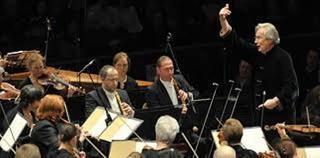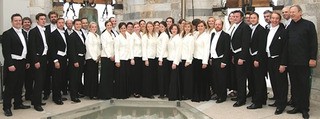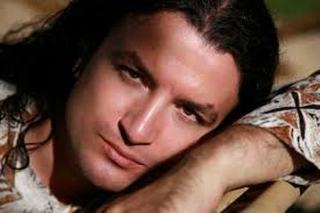|
Back
Immortal Myths for a May Day Celebration New York
Isaac Stern Auditorium, Carnegie Hall
05/01/2015 - & April 21 (Washington), 25 (Costa Mesa), 27 (San Francisco), 29 (Princeton), 2015
Claudio Monteverdi: L’Orfeo
Krystian Adam (Orpheus), Marina Flores (La Musica, Euridice, La Sperenza), Francesca Aspromonte (The Messenger), Gianluca Buratto (Caronte, Pluto), Francesca Boncompagni (Prosperina), Andrew Tortise (Shepherd, Apollo), Gareth Treseder (Shepherd, Eco, Spirit), James Hall, David Shipley (Shepherds, Spirits), Esther Brazil (Ninfa)
The Monteverdi Choir, English Baroque Soloists, Sir John Eliot Gardiner (Conductor)

English Baroque Soloists, Sir J. E. Gardiner (© Sinfinmusic.com)
“...Three guitars would be needed instead of one... In place of a single harp, three harps... The harmonies of the gods should be given to trombones and trumpets, not to lutes or harpsichord. Delicate instruments will be inappropriate.”
Claudio Monteverdi to his librettist Alessandro Striggio, 1616
If Sir John Eliot Gardiner ever consulted Claudio Monteverdi about a production of L’Orfeo, the dialogue would be over in a few minutes. For they have been, in a sense, 500-year-old kindred spirits.
Monteverdi was adamant that his opera “move” him, that his first pre-Venice court opera Orfeo “stir me to a true prayer.” Sir John, for the past half-century, has changed his readings from gracious and studied (like the composer’s first madrigals) to the true Monteverdi reading he offered last night. For this Orfeo was anything but gracious. It attempted and more than frequently achieved) an exaltation, an apotheosis of feeling, emotion not at its most delicate but at its most..well, emotional.
And while some musicologists feel that Monteverdi was the precursor of Wagner, Sir John’s ensembles were a harbinger of Verdi, and the uninhibited emotional outpourings of Puccini. Though in reality, nothing–except perhaps the blood-colors of his contemporary Caravaggio–could seem as even a remote reflection of this most singular composer.
Granted, this was a “concert version”, probably more akin to the original Mantuan court production than the expansive Orfeo later in a Venice opera house. But the concert movements were right. Euridice followed Orpheus at a distance, Charon fell asleep at the corner of the stage. Even Pluto and Persephone discussed their decisions in a genial domestic argument stage center. Yet what carried this through was not movement per se but the so dramatic, so appropriate music created by Monteverdi and produced by these wonderful ensembles.

The Monteverdi Choir (© The Monteverdi Choir)
The preceding night, Sir John had led his forces in the so-modern Vespers, where Monteverdi, like an alchemist, could choose from periods old and new, seasoned with his own inspiration. Here, he had the more daunting restrictions of putting music to the tragic retelling of Euridice’s death or the joy of Arcadian dances (last night a literal May Day celebration) or the pleas of Orpheus to the sullen Charon. Yes the Monteverdi Choir gave vent to each feeling. But Monteverdi–even more than Handel–made his orchestra speak as much as the choir.
It was one thing to hear the songs of their rustic dances. Quite another to bounce to the music of the tambourine, and listen to syncopation of hands clapping the orchestra playing.

K. Adam (© Courtesy of the Artist)
The ensemble joy of Orfeo is so complete that one almost feels a party-spoiler by listing individuals. Yet one must obviously bring Krytsian Adam’s Orfeo to the fore. Each act brings forth a new solo in this most arduous role, and Mr. Adams had the rich tenor–and the mastery of ornamentation–to do this. Yet the cynosure of word and music comes in the plea he gives to Charon the Boatman to Hades in “Mighty spirit and fearsome deity”.
This, in fact, is where librettists Striggio–a man whose poetry should reign in the same heaven as Mozart’s Lorenzo Da Ponte–triumphs. It is a strophic piece, yet each verse is different in emotion and words. Orpheus pleads, beseeches, ass-kisses, and speaks from the heart–and Charon can hear none of it. Brilliant drama.
Which means the second star here, Gianluca Buratto, who rightly doubles as basso profundo Charon and Pluto. Both are formidable bass parts. But where Charon is unmovable, Pluto does move thanks to his wife’s entreating. And the latter, Francesca Boncompagni, is a role to savor. After the heavy heavy drama of the first four acts, the scene here could have come from Jackie Gleason and Audrey Meadows in The Honeymooners. Nothing is actually funny, but Monteverdi and Striggio and Gardiner arranged this as a domestic colloquy, a respite from things immortal.
Poor Euridice, played by Marina Flores, has only a single aria. But the doubled as La Musica, and her prologue was powerful, perfect. Yet all the singing was accomplished. The voices were well balanced yet individual, their pleas, delights, surprises.
The triumph here was that after nearly two hours of uninterrupted music, it was impossible to feel anything but exalted. The strings, brass and flute were not “modern” but the sounds were anything but antiquated. The story is well known, yet I would far far more listen to Monteverdi’s retelling than that controlled well-manicured Gluck Orfeo with his dulcet flutes and silly simulacrum of dogs barking.
And at the end of this remarkable evening–actually two remarkable evenings with the Vespers–one can only hope that Sir John comes here again and again.
What we had here in Orfeo was a three-way gateway. First, Sir John’s performance. Then his reproduction of a 500-year-old performance. Third, that original performance as a reproduction of a legend taking place 3,000 years before.
And yes, it all fit. And yes, Sir John Eliot Gardiner has taken us from the original opera to our time today, with no chasms between then. So he has an even more daunting challenge.
As he has opened the doors of historic perception, it is now time to bring his cast, orchestra and chorus from New York and London and Europe back to ancient Thrace, itself is a metaphor for ageless Arcadia.
Methinks the original shepherds, oracles, gods, goddesses and spirits, who inspired Monteverdi and Gardiner, would not only listen with fascination, but inevitably dance, romp, and frolic with the same mythic exhilaration which Sir John offered us Manhattan mortals last night.
Harry Rolnick
|